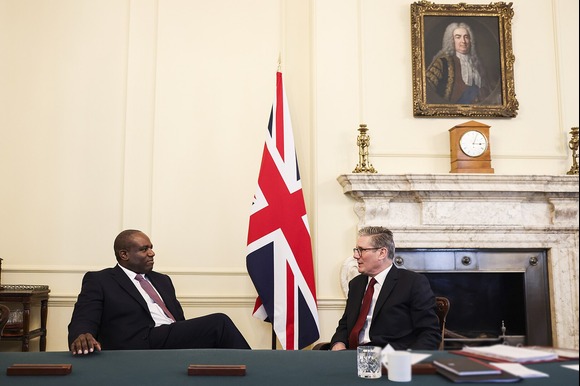The UK government is preparing charter flights to evacuate British nationals from Israel once the country’s airspace reopens, Foreign Secretary David Lammy confirmed, as regional tensions with Iran continue to escalate.
Lammy stated that the UK is coordinating with Israeli authorities to facilitate the flights, which will operate out of Tel Aviv airport. The number of flights will be determined by demand. Israel’s airspace remains closed due to the ongoing hostilities with Iran, following a series of mutual airstrikes that began after Israel targeted Iranian military and nuclear facilities, as well as key figures in its nuclear program.
The announcement coincided with Lammy’s arrival in Geneva, where he is attending high-stakes talks aimed at reaching a diplomatic resolution regarding Iran’s nuclear programme. The discussions mark Iran’s first direct engagement with Western diplomats since the recent outbreak of violence and include representatives from the European Union, Germany, and France, alongside Iranian Foreign Minister Abbas Araghchi.
British nationals in Israel or the Occupied Palestinian Territories have been instructed to complete an online form, including their email address and UK passport number, to register their presence and receive updates on flight arrangements. According to the Foreign Office, these evacuation flights will only be available to those holding valid UK passports.
Lammy emphasized that the registration process is essential for identifying British nationals in need of assistance. “We are urging all British nationals in the region to register so that they can receive timely information and support,” he said.
While Israeli airspace is shut, land borders remain open. Lammy noted that UK government staff are on-site at border crossings to assist British nationals who exit Israel by land. Support includes transport to nearby international airports to facilitate onward travel.
Earlier in the week, the Foreign Office confirmed the temporary withdrawal of dependents of staff at both the British embassy in Tel Aviv and the British consulate in Jerusalem. The move, described as a precautionary measure, comes amid growing fears of wider regional destabilisation.
Ahead of the Geneva talks, Lammy said there is a brief but critical opportunity to de-escalate the crisis through diplomacy. “A window now exists within the next two weeks to achieve a diplomatic solution,” he stated, underscoring the urgency of the negotiations.
The current conflict was sparked on 13 June, when Israel launched a surprise series of coordinated strikes across Iran, aimed at crippling what it claims is a nuclear weapons programme. Iran maintains that its nuclear programme is purely civilian in nature.
In retaliation, Tehran unleashed a barrage of missiles and drones targeting Israeli cities and military sites. Since then, both nations have engaged in near-daily exchanges of fire, raising concerns of a broader regional war.
The United Kingdom is one of several countries implementing evacuation operations in response to the deteriorating security situation. Australia has begun repatriating approximately 1,500 citizens from Iran and another 1,200 from Israel. Some Australian nationals have already reached Cyprus by sea as part of these efforts.
China, meanwhile, has evacuated over 1,600 of its citizens from Iran and several hundred more from Israel, according to its foreign ministry. Chinese authorities continue to urge nationals in the region to make use of open land routes to exit the conflict zones.
India has also announced plans to evacuate any citizens in Israel wishing to leave, and Japan has deployed two military transport aircraft to Djibouti to prepare for evacuating Japanese nationals from both Iran and Israel.
Pakistan reports that roughly 3,000 of its citizens have already departed Iran since hostilities erupted last week. Governments across the globe continue to monitor the volatile situation and adjust their contingency plans accordingly.






